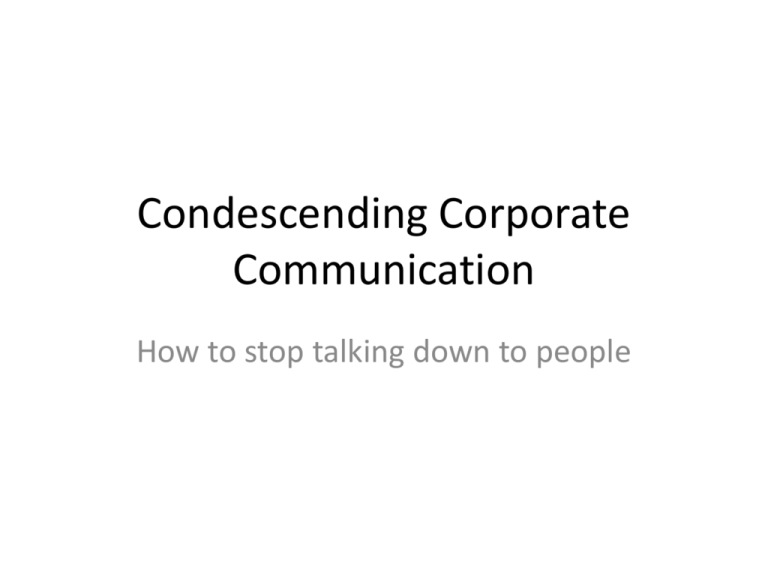In an era characterized by an ever-increasing interconnectivity amongst individuals, the nuances of communication have assumed unprecedented importance. The Bahá’í teachings, which espouse principles of unity, equity, and justice, offer profound insights into navigating the choppy waters of condescending communication. The challenge before us is how to engage effectively with condescension without succumbing to the instinctual responses that may further escalate tensions. So, how can we harness the principles of kindness and patience advocated by Bahá’í teachings to respond to such challenges?
First and foremost, it’s imperative to recognize that communication is a two-way street. When confronted with a condescending remark or patronizing tone, an individual may feel belittled or frustrated. This reaction is perfectly natural. However, the Bahá’í principle of “consultation” inspires us to respond thoughtfully. Instead of retaliating with defensiveness, one can take a moment to reflect on the intent behind the words. Are they meant to demean, or could they stem from misunderstanding or personal struggle?
In line with the Bahá’í understanding of the fundamental oneness of humanity, it is crucial to approach the situation with empathy. Consider employing strategies that focus on active listening. This communicates not only that you seek to understand the other party, but also that you value their perspective, regardless of how condescending they may appear. Such active engagement can potentially disarm condescension, paving the way for a more constructive dialogue.
The act of compassion is central to Bahá’í teachings. Engaging a condescending individual with kindness may seem like a daunting endeavor. Yet, it is vital to remember that every encounter is an opportunity for spiritual growth. Responding with compassion does not imply tolerating disrespect but rather choosing to rise above the immediate emotional turmoil. A gentle response can transform an adversarial moment into a possibility for mutual understanding.
Furthermore, the Bahá’í principle of detachment can prove invaluable in addressing condescension. When one cultivates an inner state of detachment from the outcomes of an encounter, it lessens the emotional toll such situations might invoke. This principle encourages individuals to rise above ego-driven reactions, thus allowing for a response grounded in wisdom rather than emotion. Practicing detachment does not equate to indifference; rather, it fosters a space for measured and thoughtful responses, ultimately contributing to more effective communication.
Imbuing your response with a tone of sincerity can also counteract condescension effectively. When confronted with a condescending remark, an approach laden with sincerity may lead to introspection in the other party. Consider approaching the subject matter with curiosity, employing questions that prompt deeper reflection rather than mere rebuttal. For instance, asking, “What prompted your view?” can lead to a dialogue rather than an escalation. Such questions exemplify the Bahá’í ethos of dialogue and understanding.
Incorporating humor—when appropriate—can often diffuse the tension in awkward communicative situations. A light-hearted comment delivered in good faith may provide a gentle reminder to the other party that condescension, regardless of intentions, can undermine the communication process. Humor is a complex tool that, when used judiciously, can soften hearts and refocus the dialogue. It is essential, however, to ensure that humor does not belittle or further alienate the individual in question.
As we delve deeper into the Bahá’í principle of unity, it is crucial to contemplate the implications of our responses beyond the immediate encounter. Each interaction shapes the tapestry of human communication. A response steeped in the virtues of patience and understanding transcends the moment, influencing the broader context of societal interactions. Thus, it is our responsibility to act as exemplars of the principles we hold dear.
Gratitude is another key aspect derived from Bahá’í teachings that can serve as a transformative force when facing condescending communication. Expressing gratitude—even for difficult encounters—can lead to personal elevation and cultivate an atmosphere of respect. Recognizing that these interactions serve as opportunities for learning can shift one’s perspective and enable more constructive engagements in the future.
In practice, consider establishing guidelines for yourself when confronting condescension. This could involve a preemptive pause, allowing a moment of silence before responding. This brief interlude can help cool immediate emotional responses and yield a more thoughtful, composed reply. Likewise, journaling reflections on challenging interactions can enhance the depth of your understanding and equip you for future challenges.
Yet, it is undoubtedly crucial to establish boundaries. Engaging in dialogue does not obligate one to endure persistent condescension. The Bahá’í teachings advocate for a balanced approach, which includes protecting one’s own dignity while fostering an environment of mutual respect. If a particular individual consistently exhibits condescending behavior, it may be appropriate to reassess the dynamics of that relationship. Maintaining personal pride and self-respect aligns with the teachings of Bahá’u’lláh, emphasizing the importance of treating oneself with the same dignity one extends to others.
In conclusion, navigating condescending communication through the lens of Bahá’í principles presents a profound opportunity for personal and collective growth. Engaging with empathy, practicing detachment, employing sincere dialogue, and invoking humor can transform potentially adversarial encounters into pathways for understanding. The challenge of responding to condescension is not merely about conflict resolution; it is about embodying the teachings of unity and compassion inherent in the Bahá’í faith. So, the next time you encounter condescension, consider: how might your response cultivate the bonds that unite us as a global community?
